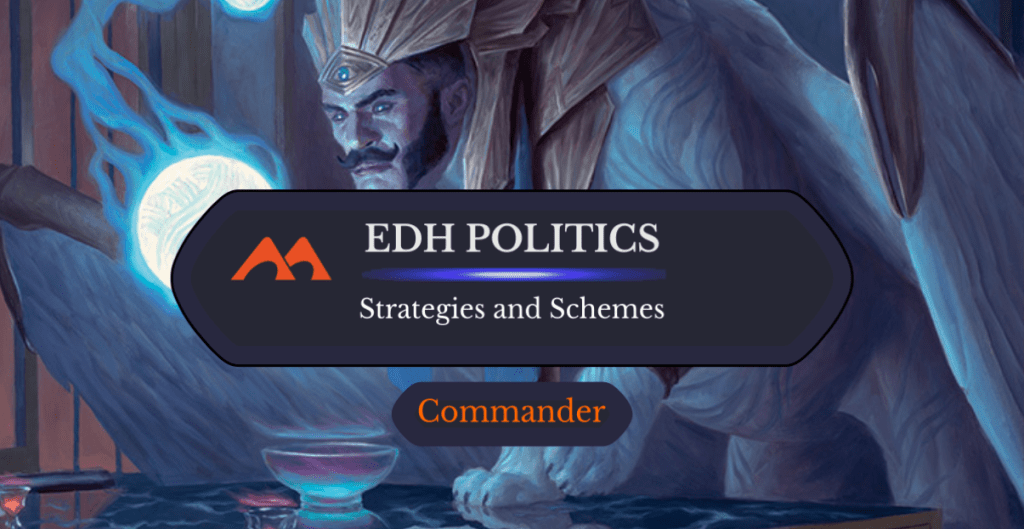
Tivit, Seller of Secrets | Illustration by Chris Rahn
Much of Magic happens “above the neck” rather than “in the hands.” The control of information and accurate threat assessment in a Commander game is a battle of wits that you can and should be participating in, even when that game doesn’t necessarily involve the actual cards and spells.
That’s right, much of what makes Commander Commander is the social and political discussions that take place in game as players work to identify who the biggest threat is, or who can keep them alive this turn, or who’s shutting them out from casting their big, game-ending spell. By working with other players, either via mechanics built into the game like voting and offers or by cutting deals at the table, players use political strategies to influence the outcome of the game whether they know it or not.
What are politics in Commander, really? And how can you use them most effectively in game? Read on and let’s find out what makes EDH so political!
What Is Politics in Commander?
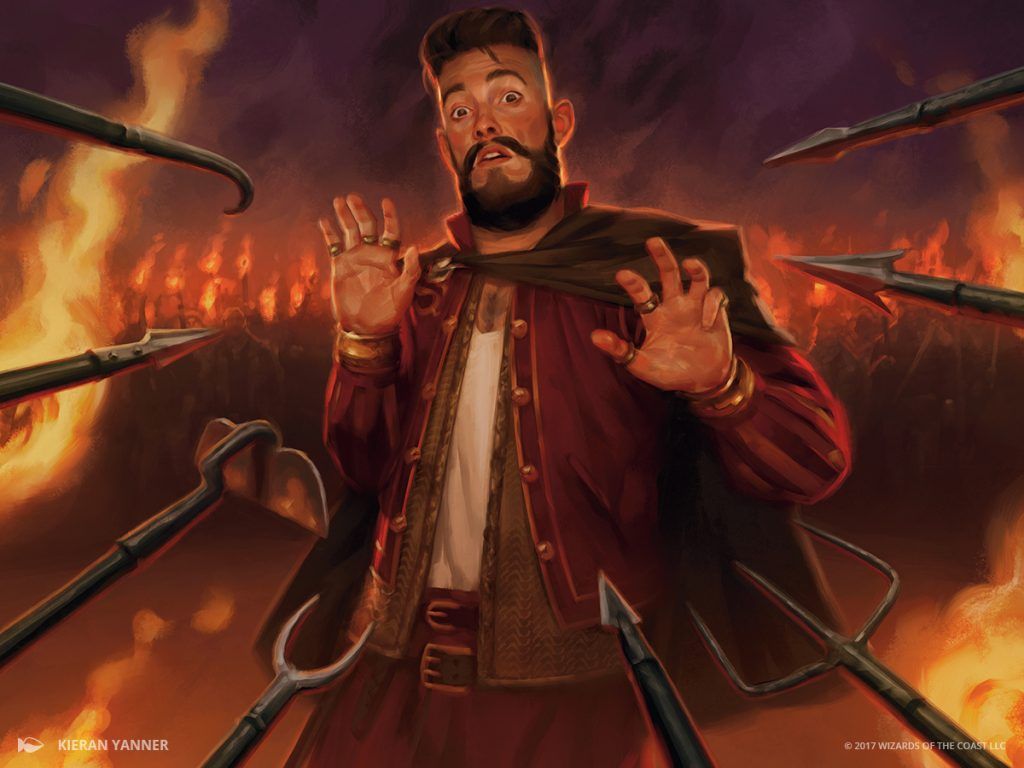
Curse of Vitality | Illustration by Kieran Yanner
The concept of politics in games of Commander is the idea that you can use social moves and plays that happen outside the game to influence game actions. That makes it sound much more complex than it is, many of you are probably already using politics in your Commander games by the simple virtue of talking to the other players about the board state.
Using political plays to further your own agenda in-game has become a hallmark of multiplayer formats. Here, we’ll be discussing the best strategies for employing politics in your EDH pods, from baked-in ability words like tempting offer to coercive deals cut in the heat of battle to save your hide. Let the puppet mastery begin!
Voting
“Nobody vote time! Nobody vote time!!”
A number of multiplayer sets included cards which use a voting mechanic. Cards like Council's Judgment call for every player to vote for an outcome, either voting for one of two outcomes or voting on specific permanents or players. These political cards always generate instant discussion on what the primary targets of your Custodi Squire should be or whether it's best to give you free permanents or extra turns from Expropriate. Combine these cards with some of the more social political strategies to influence the board state for your own purposes!
Tempting Offers
“I can help you ramp, but remember this when you’re caught up to the rest of us.”
The first cycle of truly political EDH cards were the tempting offers from Commander 2013. Each spell in this five-card cycle has a middling effect when cast that then copies itself for each of your opponents who copies it. Using the tempting offers requires you to know your opponents’ decks, or at least to identify what they need at that moment.
On more than one occasion, I’ve convinced my friend running an aristocrats deck to take my deal with Tempt with Vengeance when he needs tokens to sacrifice and I need attackers on the board. In another scenario, you see that the mono-blue player is struggling to find the islands they need to actively participate in the game; why not propose a deal with Tempt with Discovery?
Goading
“I’m sorry, I’ve got to block that attacker.”
Sometimes a player just doesn’t want to play the same game the rest of your pod is playing, and goading is a great way to gently encourage them to join you in the combat step. Goading forces a creature to attack, and attack a player besides you, turning your opponents’ threats against each other. I’ve used goading less to make friends at the pod and more as a tactic to break up alliances. If I can goad your homie’s Master of Cruelties every turn, they’re suddenly the target, not me. No matter what’s been said and agreed to up to that point, when you’re staring 1 life in the face, you make moves to save your own hide.
Curses
“Why me?!”
Curses are auras that specifically enchant a player. Usually, they’re detrimental effects, like Curse of Death's Hold or Overwhelming Splendor, but a suite of Commander-specific curses have been printed over the past decade. Notably, cards like Curse of Opulence and Curse of Verbosity reward both you and your opponent whenever they attack the enchanted player. An early game curse makes an excellent way to paint a target on a player immediately – and gives you some leverage, later on, to offer not attacking them in exchange for some other boon.
“Dealer’s Choice”
“Who wants to let me draw three cards?”
We’ve got a running joke in my playgroup where our Mayael the Anima player seems to always hit Combustible Gearhulk off the top, so much so that we’ve taken to calling it “good ol’ rock” (in reference to the Simpsons). The red Gearhulk forces an opponent to make a decision: let you draw three cards, or possibly take a whopping amount of damage. Choosing which opponent to target with these effects requires some political thinking. The player at 10 life is a lot more likely to let you draw cards than the one at 55 life.
Being “Nice”
“Can I hit you with my Magpie so I can draw a card?”
Moving on from specific mechanics to general tactics, there’s no substitute for asking nicely in EDH. Sometimes, that Okaun, Eye of Chaos / Zndrsplt, Eye of Wisdom deck is going off and drawing 40 cards this turn, and you just need to catch up. That dang coin-flip deck has too many blockers for your Thieving Otter to make it through, so try just asking another player. Incentivize them to let your attacker through with some whinging and whining, call out the Okaun deck as the main “threat,” and hope for the best!
Cutting Deals
“I’ll get rid of Lightning Greaves if you get rid of the creature.”
The best part of a 4-player Commander game is the high likelihood that someone, anyone, has removal for that protected Nekusar, the Mindrazer that’s pinging everyone’s life so, so violently. When a threat to the table is identified, players often exchange worried glances, asking “so, who’s got removal?” Capitalize on these moments to make new allies – offer to combine your artifact removal spells to get the Lightning Greaves off of their commander before someone else casts Darksteel Mutation.
Teaming Up
“They’re the biggest threat! Hit them!”
There’s no friends like those you make when you’re backed against a corner. This one feels like a no-brainer, but it's worth mentioning. We’ve all been there: the Chainer, Dementia Master deck had a perfect turn 1, dark-ritualing into mana rocks and then into Bog Witch and their commander before anyone else could blink. Next turn, they’re discarding and reanimating Kokusho, the Evening Star and you’re all about to be sorry. Time for everyone to swing out at the Chainer player before things get ever more dire!
Trading Threats
“I’ll swing my 6/6 in and lose it if you’ll block with your deathtoucher”
This one is sort of the inverse of teaming up to focus on the most powerful player. Commander games tend to run longer than typical Magic games, with the perceived threat levels of each player shifting throughout. One of the best ways for a politically-focused deck to win is to fly under the radar until the time comes to finish everyone off. If my Grave Titan is making me the juicy target at the table, and I don’t have an out immediately available to end the game, maybe it’s best I cut my losses and just trade it down into a smaller creature. This might seem counterintuitive, but there’s something to be said about losing the battle but winning the war.
Surrendering Strategically
“I’ll scoop before the X happens so you can defeat Y”
Probably the funniest line of text in the official MTG rules is “A player may concede the game at any time.” Scooping your cards when you know you’ve lost saves everyone time and aggravation, but it can also make an effective political play when executed correctly.
Here’s an example: I’m about to lose to the life drain triggers on the stack from Player A’s Blood Artist. My Curse of Exhaustion has kept Player B’s storm deck from popping off all game. Player A has been getting on my nerves all night, and already won the first game we’ve played, so I’ve just about had it with them. I’ll offer to Player B to concede the game while the triggers are on the stack, removing my Curse of Exhaustion from the game instantly, allowing Player B to storm off with their Isochron Scepter and burn Player A to death before they can gain life from their Blood Artist. Technically, this doesn’t win you the game, but it will earn you some political points for the rematch.
Coercion
“Hit me and you’re my new target.”
Coercion, sometimes interpreted as straight-up threats, is another fairly simple tactic. All it takes is a strong board presence. When you’re the archenemy at the table, sometimes the threat of retaliation is enough to disrupt whatever alliance your opponents hoped to form against you.
Political Information
“I’ve got a Counterspell and 2 blue up, so don’t try to boardwipe yet.”
The power of information can’t be understated in Commander, or even Magic more broadly. Trading information to players for some benefit to you is a common ploy to stay relevant in the game. Note that it's perfectly legal to reveal any hidden information you control to your opponents in Magic – this doesn’t bend the rules in any way.
For example, you see your opponent has almost assembled their game-winning combo, and while they’re not your immediate threat, you still don’t want them comboing off and destroying your board before you can do the same. Show them that Counterspell in your hand and keep the 2 blue mana up you need to cast it, and let them know you’ll use it if you have to.
Political Commanders
If you’re looking to build an entire Commander deck around politics in EDH, there’s no shortage of options when it comes to legendary creatures.
Zedruu the Greathearted
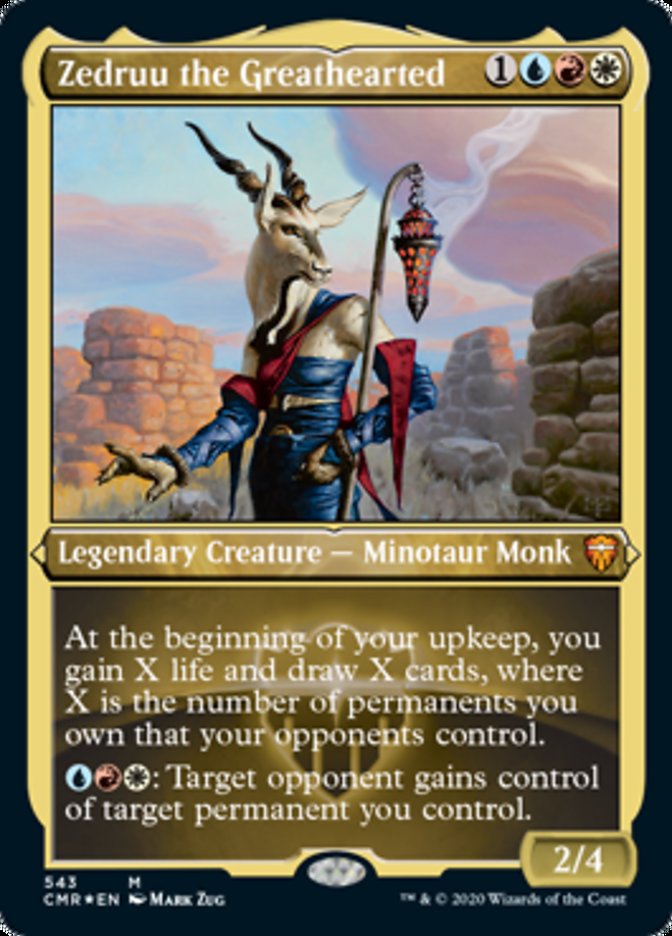
The original politics commander is Zedruu the Greathearted. Zedruu’s ability to pass your permanents around the board is usually used to give other players detrimental effects like Bronze Bombshell or Grid Monitor, but there also exists a “nice guy” Zedruu build wherein you pass positive effects out to players to garner their favor.
Vazi, Keen Negotiator
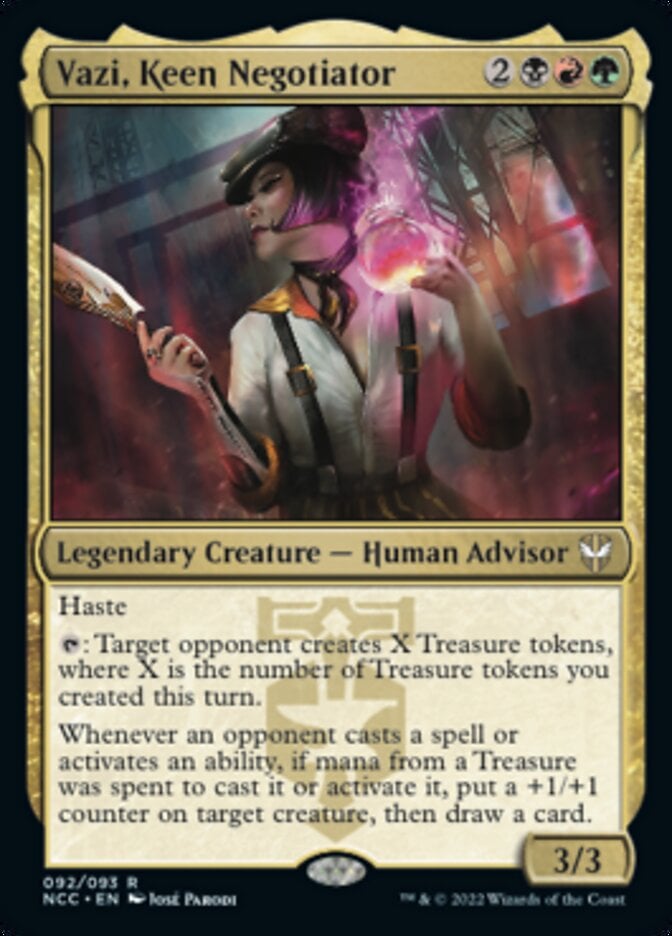
Magic is a game about casting spells, and nobody’s having fun when they can’t cast spells. Vazi, Keen Negotiator lets you pass out free mana to the other players falling behind at the table, with the caveat that every Treasure they spend benefits you in some way. Form an early alliance with another player and let them go wild with Treasure tokens while you dig through your library and then swing in with a 20/20 Vazi.
Phelddagrif
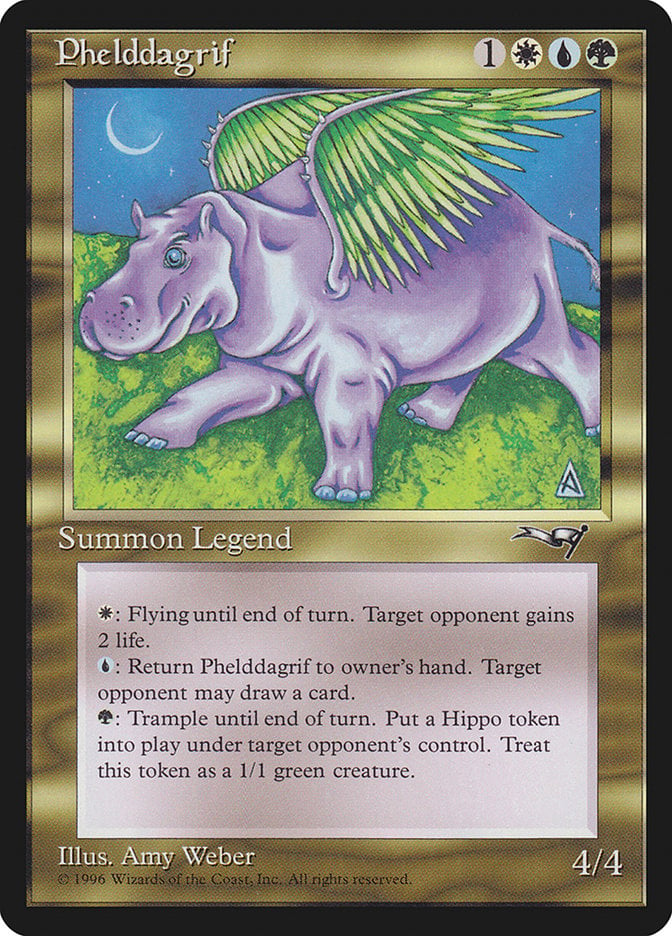
Phelddagrif doesn’t get enough credit for being the first commander to use the “group hug” archetype. Phelddagrif doesn’t want to hurt anybody; it just wants to give them free blockers and let them draw cards. Play nice with your Phelddagrif deck until you can set up some infinite mana, then show everybody what too much of a good thing can do to them as you force them to draw their entire libraries or drain them to death with infinite hippos and a Suture Priest.
Tivit, Seller of Secrets
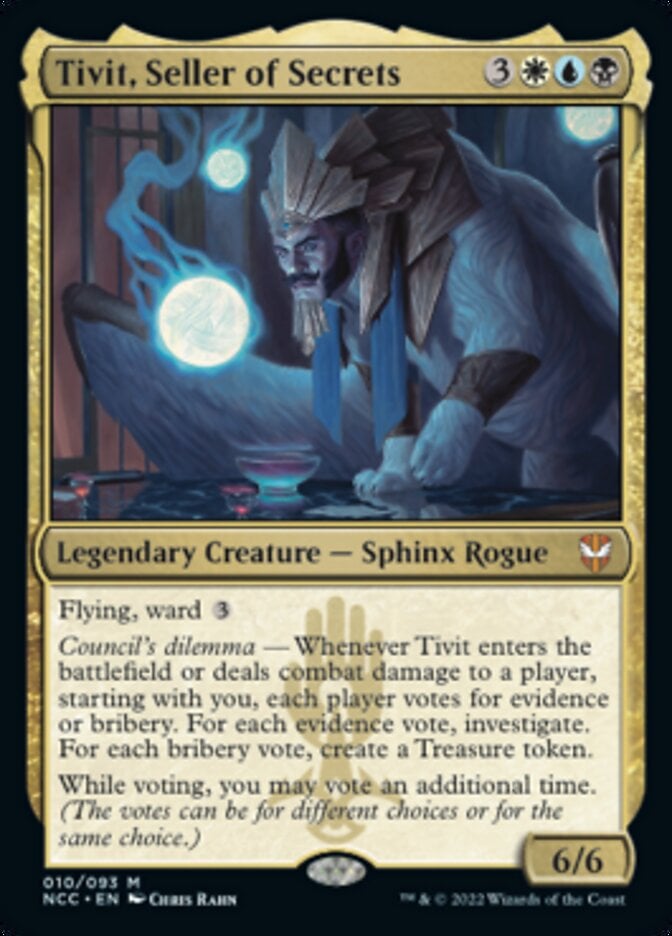
While Tivit, Seller of Secrets’s own voting ability exclusively benefits you, the additional vote it grants you for any instance of voting can supremely influence the game.
When built around the entire suite of will of the council and council’s dilemma cards, Tivit takes those democratic and gives you absolute power over the outcomes. With that additional vote, you can dispense justice however you see fit, using your Coercive Portal like a 4-mana boardwipe or perfectly splitting the vote on Council's Guardian.
Are Politics Legal in Commander?
Politics, political discussions, and the like aren’t against the Magic rules. Players are allowed to discuss plans and offer to help each other however they like at the table. Players can focus their attacks all on a single opponent if they wish or refuse to interact with a play even though it might be beneficial for them to do so.
However, this also means there’s no penalty for lying to an opponent about your intentions and going back on a promise you’ve made. You may lose others’ willingness to play with you, though.
Wrap Up

Vazi, Keen Negotiator | Illustration by Jose Parodi
If there are more than two players in a game, there are always politics. An uneven playing field means that at some point, you’ll have to choose between attacking Player A or Player B, and they’ll have to choose whether to hold it against you. Learning to work within the intricate web of politics in your EDH pods is one of the easiest ways to refine your skills, and it usually helps generate discussion at the table. Ultimately, playing into the politics of your pod makes the game more social, and therefore more enjoyable.
What do you think of politics at the table? Are you a hard and fast believer that players should never cut deals at the table, or are you constantly making and breaking alliances? Is playing politics very sportsmanlike? Let me know in the comments, or over on Draftsim’s TwXtter.
Thanks for reading, and don’t forget to vote!
Follow Draftsim for awesome articles and set updates: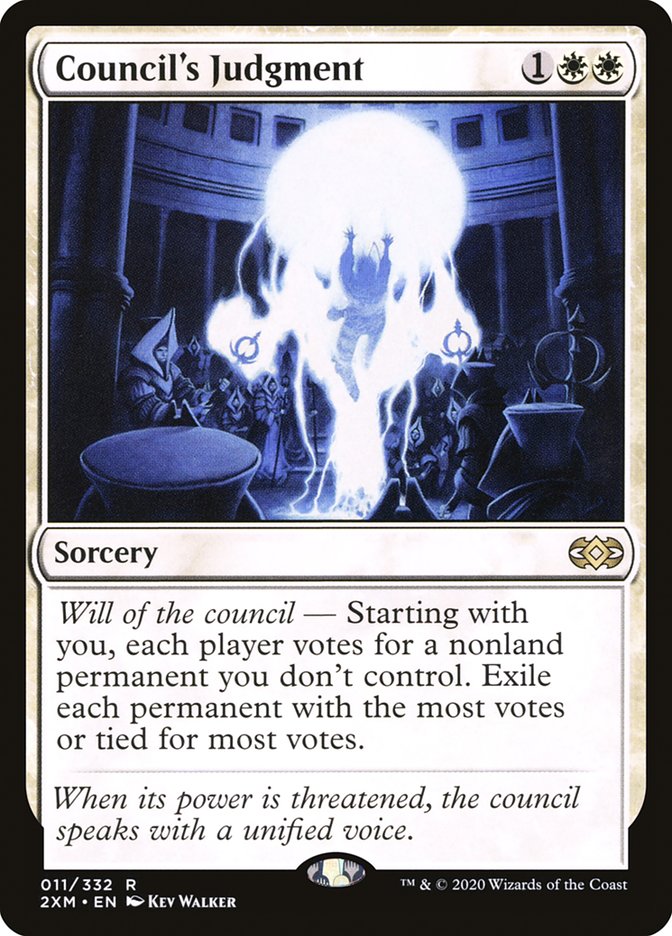
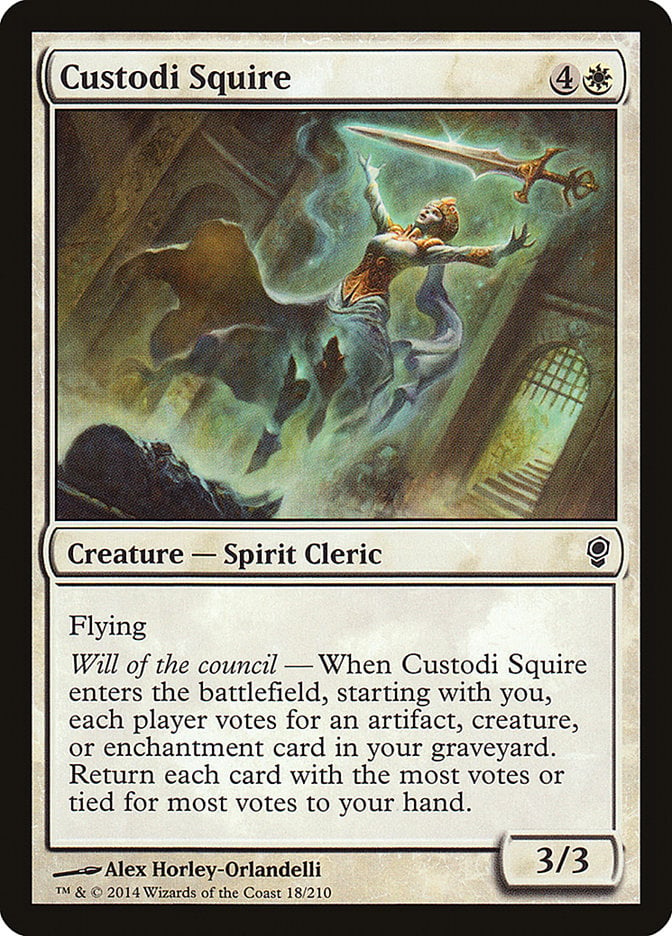
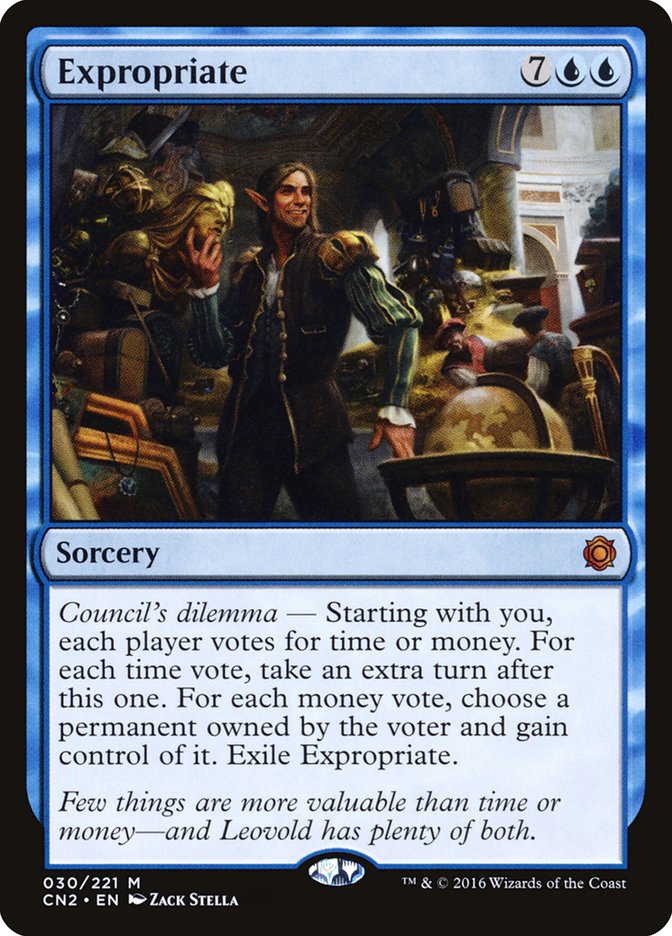
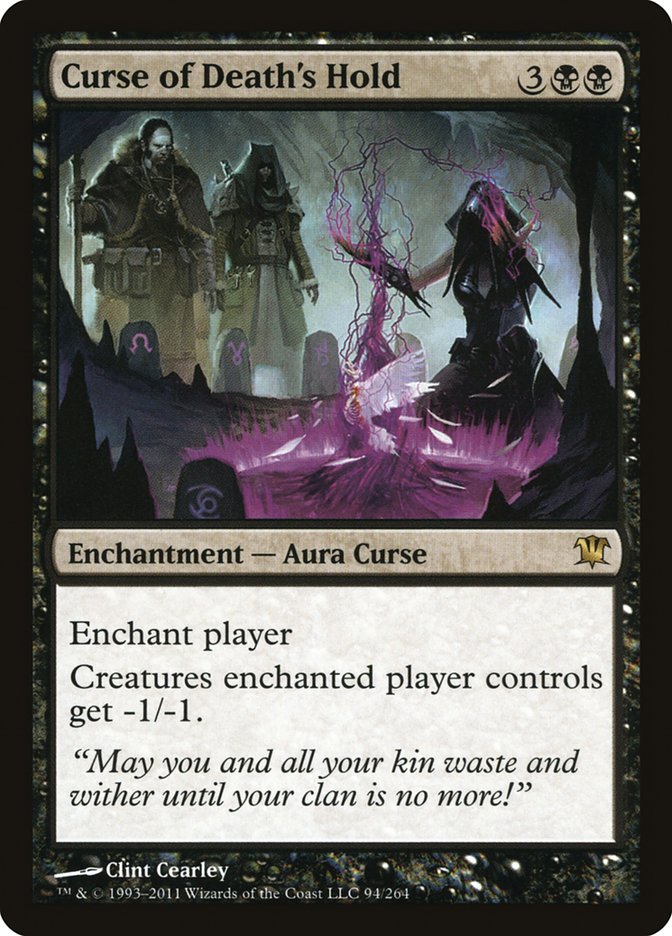
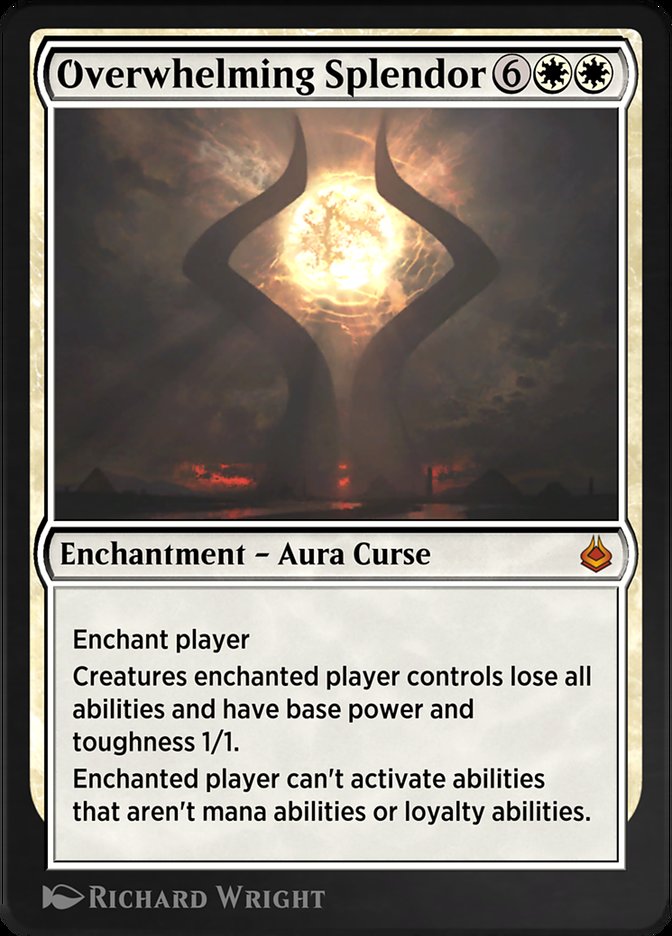
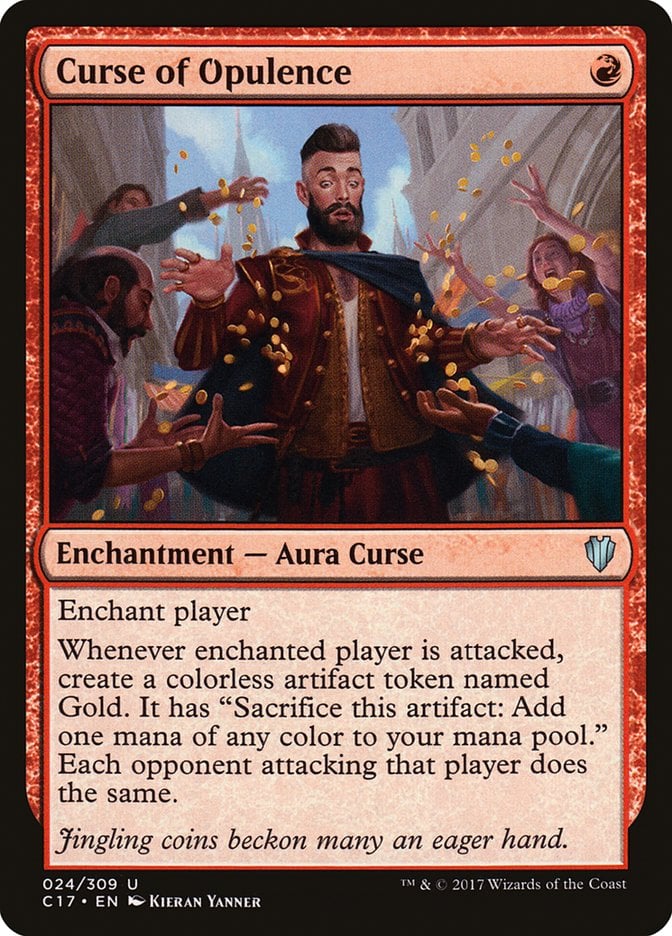
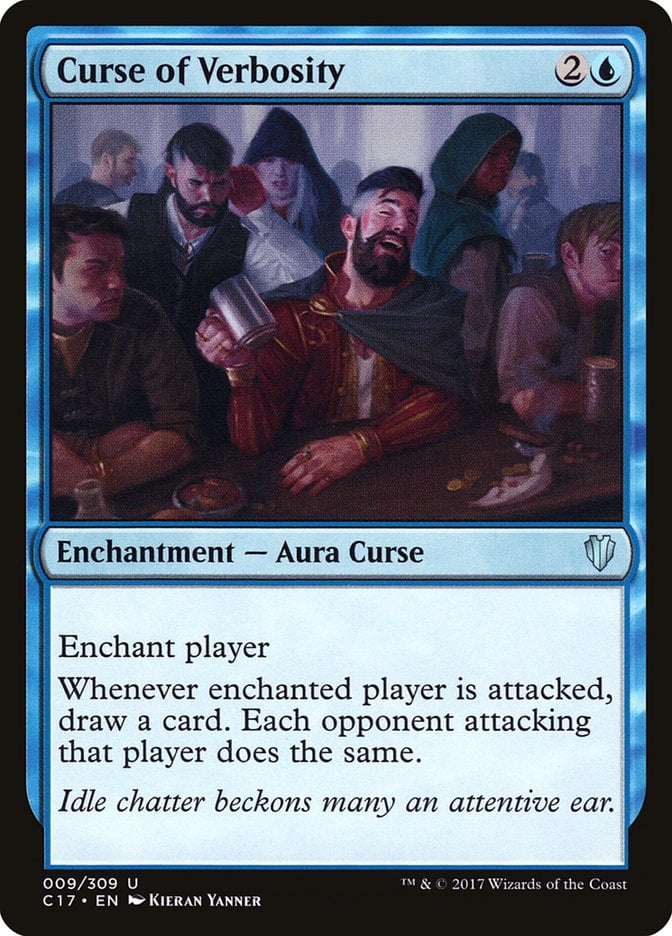
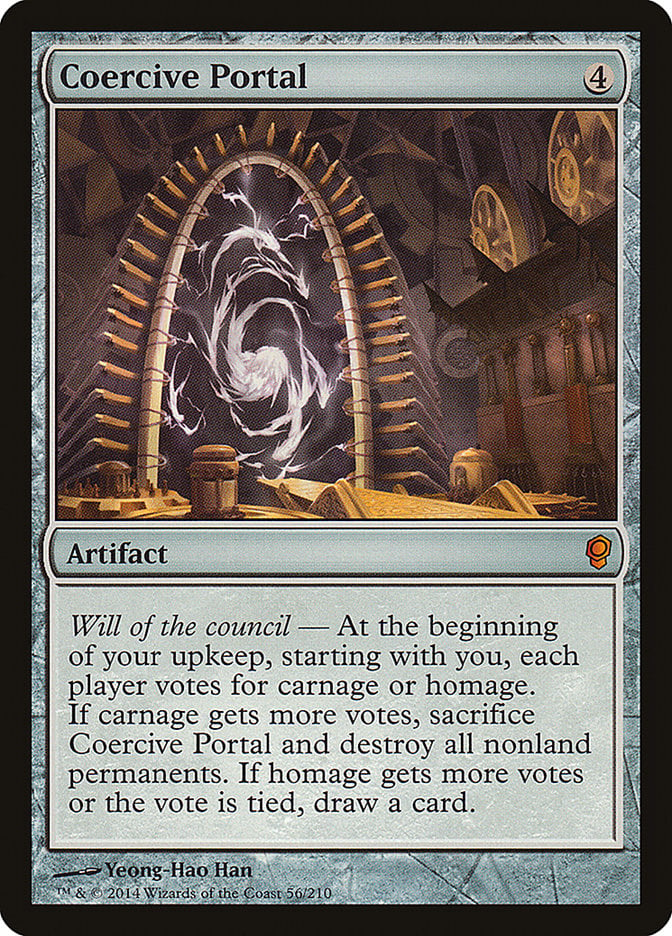
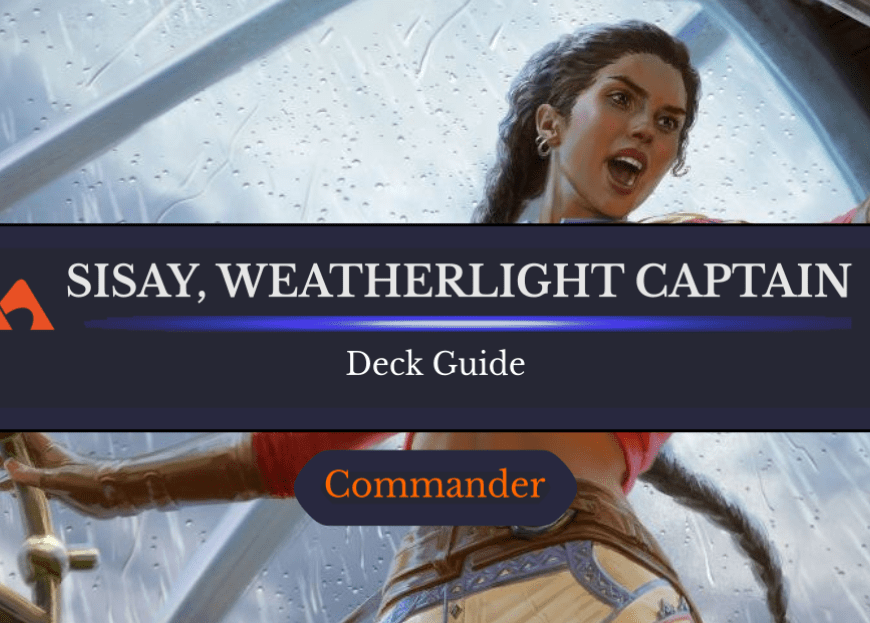
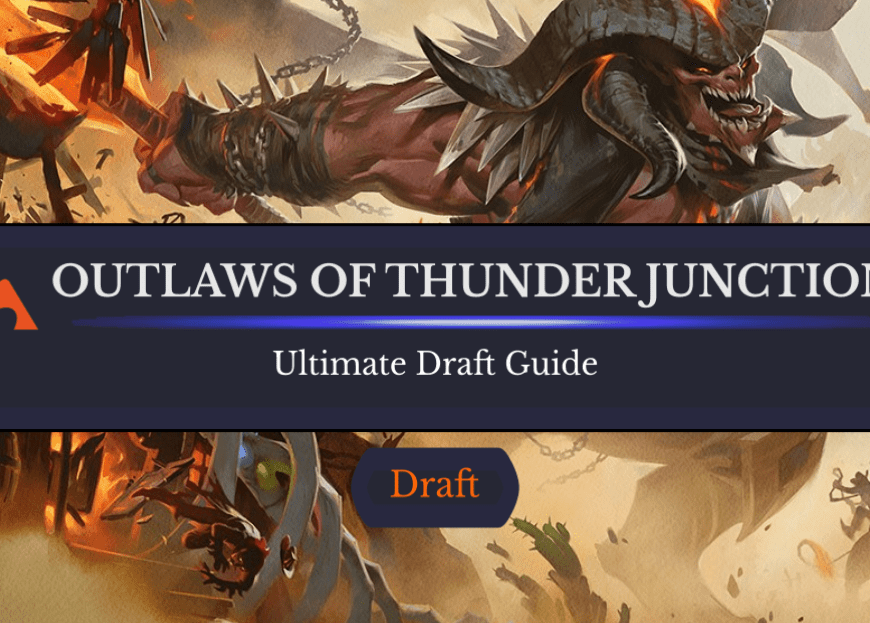
Add Comment